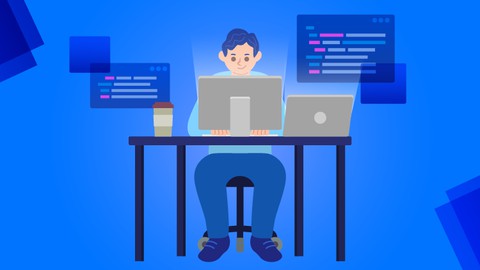
Haskell Exercises for Beginners
Haskell Exercises for Beginners, available at $54.99, has an average rating of 4.8, with 34 lectures, 4 quizzes, based on 21 reviews, and has 11909 subscribers.
You will learn about How to do basic I/O with Haskell How to use variables How to use functions How to use arrays This course is ideal for individuals who are Beginner Haskell developers It is particularly useful for Beginner Haskell developers.
Enroll now: Haskell Exercises for Beginners
Summary
Title: Haskell Exercises for Beginners
Price: $54.99
Average Rating: 4.8
Number of Lectures: 34
Number of Quizzes: 4
Number of Published Lectures: 34
Number of Published Quizzes: 4
Number of Curriculum Items: 38
Number of Published Curriculum Objects: 38
Original Price: $19.99
Quality Status: approved
Status: Live
What You Will Learn
- How to do basic I/O with Haskell
- How to use variables
- How to use functions
- How to use arrays
Who Should Attend
- Beginner Haskell developers
Target Audiences
- Beginner Haskell developers
Haskell is a standardized, general-purpose purely functional programming language, with non-strict semantics and strong static typing. It is named after the mathematician Haskell Curry. The language is very expressive and has an elegant strong typing system. The language allows you to write code at a very high level, making it easier to write correct code. Because of this, Haskell is particularly useful for writing complex mathematical programs, as well as computer programs that manipulate abstract data types.
The “Haskell” programming language is the most purely functional language ever devised. It has an elegant, concise, highly expressive type system that gives it superior support for software engineering. It allows concise code to be reused in many different scenarios, leading to shorter, clearer, and more maintainable code.
Haskell is a purely functional programming language that is often used for research and development. The Haskell language, defined in the 1990s, has had a profound impact on how people learn to think about computer programs. The paradigm used (functional programming) is different from the traditional models like procedural programming (C) or object orientated programming (Java, C++, C#).
Programming is something you learn by doing, and this course is a collection of programming exercises for the Haskell language. It starts with basic exercises and it gradually increases in complexity.
Course Curriculum
Chapter 1: Introduction
Lecture 1: Introduction
Chapter 2: Basic I/O
Lecture 1: Question
Lecture 2: Solution 1
Lecture 3: Question
Lecture 4: Solution 2
Lecture 5: Question
Lecture 6: Solution 3
Lecture 7: Question
Lecture 8: Solution 4
Lecture 9: Question
Lecture 10: Solution 5
Lecture 11: Question
Lecture 12: Solution 6
Lecture 13: Question
Lecture 14: Solution 7
Chapter 3: Variables
Lecture 1: Question
Lecture 2: Solution 8
Lecture 3: Question
Lecture 4: Solution 9
Chapter 4: Functions
Lecture 1: Question
Lecture 2: Solution 10
Lecture 3: Question
Lecture 4: Solution 11
Chapter 5: Exercise Arrays/Lists
Lecture 1: Question
Lecture 2: Solution 12
Lecture 3: Question
Lecture 4: Solution 13
Lecture 5: Question
Lecture 6: Solution 14
Lecture 7: Question
Lecture 8: Solution 15
Lecture 9: Question
Lecture 10: Solution 16
Lecture 11: More Exercises
Instructors
-
Peter A
Ethical Hacker
Rating Distribution
- 1 stars: 0 votes
- 2 stars: 0 votes
- 3 stars: 4 votes
- 4 stars: 8 votes
- 5 stars: 9 votes
Frequently Asked Questions
How long do I have access to the course materials?
You can view and review the lecture materials indefinitely, like an on-demand channel.
Can I take my courses with me wherever I go?
Definitely! If you have an internet connection, courses on Udemy are available on any device at any time. If you don’t have an internet connection, some instructors also let their students download course lectures. That’s up to the instructor though, so make sure you get on their good side!
You may also like
- Best Video Editing Courses to Learn in March 2025
- Best Music Production Courses to Learn in March 2025
- Best Animation Courses to Learn in March 2025
- Best Digital Illustration Courses to Learn in March 2025
- Best Renewable Energy Courses to Learn in March 2025
- Best Sustainable Living Courses to Learn in March 2025
- Best Ethical AI Courses to Learn in March 2025
- Best Cybersecurity Fundamentals Courses to Learn in March 2025
- Best Smart Home Technology Courses to Learn in March 2025
- Best Holistic Health Courses to Learn in March 2025
- Best Nutrition And Diet Planning Courses to Learn in March 2025
- Best Yoga Instruction Courses to Learn in March 2025
- Best Stress Management Courses to Learn in March 2025
- Best Mindfulness Meditation Courses to Learn in March 2025
- Best Life Coaching Courses to Learn in March 2025
- Best Career Development Courses to Learn in March 2025
- Best Relationship Building Courses to Learn in March 2025
- Best Parenting Skills Courses to Learn in March 2025
- Best Home Improvement Courses to Learn in March 2025
- Best Gardening Courses to Learn in March 2025






















